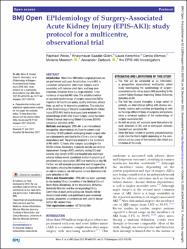| dc.contributor.author | Weiss, Raphael | |
| dc.contributor.author | Saadat-Gilani, Khaschayar | |
| dc.contributor.author | Kerschke, Laura | |
| dc.contributor.author | Wempe, Carola | |
| dc.contributor.author | Meersch, Melanie | |
| dc.contributor.author | Zarbock, Alexander | |
| dc.contributor.author | Makhloufi, Hichem | |
| dc.contributor.author | Sağır, Özlem | |
| dc.date.accessioned | 2022-10-06T07:54:21Z | |
| dc.date.available | 2022-10-06T07:54:21Z | |
| dc.date.issued | 2021 | en_US |
| dc.identifier.issn | 2044-6055 | |
| dc.identifier.uri | https://doi.org/10.1136/bmjopen-2021-055705 | |
| dc.identifier.uri | https://hdl.handle.net/20.500.12462/12577 | |
| dc.description | Sağır, Özlem (Balikesir Author) | en_US |
| dc.description.abstract | Introduction More than 300 million surgical procedures are performed each year. Acute kidney injury (AKI) is a common complication after major surgery and is associated with adverse short-term and long-term outcomes. However, there is a large variation in the incidence of reported AKI rates. The establishment of an accurate epidemiology of surgery-associated AKI is important for healthcare policy, quality initiatives, clinical trials, as well as for improving guidelines. The objective of the Epidemiology of Surgery-associated Acute Kidney Injury (EPIS-AKI) trial is to prospectively evaluate the epidemiology of AKI after major surgery using the latest Kidney Disease: Improving Global Outcomes (KDIGO) consensus definition of AKI. Methods and analysis EPIS-AKI is an international prospective, observational, multicentre cohort study including 10 000 patients undergoing major surgery who are subsequently admitted to the ICU or a similar high dependency unit. The primary endpoint is the incidence of AKI within 72 hours after surgery according to the KDIGO criteria. Secondary endpoints include use of renal replacement therapy (RRT), mortality during ICU and hospital stay, length of ICU and hospital stay and major adverse kidney events (combined endpoint consisting of persistent renal dysfunction, RRT and mortality) at day 90. Further, we will evaluate preoperative and intraoperative risk factors affecting the incidence of postoperative AKI. In an add-on analysis, we will assess urinary biomarkers for early detection of AKI. Ethics and dissemination EPIS-AKI has been approved by the leading Ethics Committee of the Medical Council North Rhine-Westphalia, of the Westphalian Wilhelms-University Münster and the corresponding Ethics Committee at each participating site. Results will be disseminated widely and published in peer-reviewed journals, presented at conferences and used to design further AKI-related trials. Trial registration number NCT04165369. © | en_US |
| dc.language.iso | eng | en_US |
| dc.publisher | BMJ Publishing Group | en_US |
| dc.relation.isversionof | 10.1136/bmjopen-2021-055705 | en_US |
| dc.rights | info:eu-repo/semantics/openAccess | en_US |
| dc.subject | Acute Renal Failure | en_US |
| dc.subject | Adult Intensive & Critical Care | en_US |
| dc.subject | Chronic Renal Failure | en_US |
| dc.subject | Epidemiology | en_US |
| dc.subject | Surgery | en_US |
| dc.title | EPIdemiology of Surgery-Associated Acute Kidney Injury (EPIS-AKI): Study protocol for a multicentre, observational trial | en_US |
| dc.type | article | en_US |
| dc.relation.journal | BMJ Open | en_US |
| dc.contributor.department | Tıp Fakültesi | en_US |
| dc.identifier.volume | 11 | en_US |
| dc.identifier.issue | 12 | en_US |
| dc.identifier.startpage | 1 | en_US |
| dc.identifier.endpage | 9 | en_US |
| dc.relation.publicationcategory | Makale - Uluslararası Hakemli Dergi - Kurum Öğretim Elemanı | en_US |


















